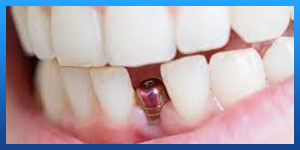Dental Implants Side Effects
Dental Implant Complications and Failure
A dental implant is a metal post that’s surgically attached to the jaw bone to support an artificial tooth. Once in place, a restorative dentist or oral surgeon mounts a replacement tooth to the implant.
Dental implants have a high success rate, but some people experience dental implant failure. It’s estimated that about 5 to 10 percent of dental implants fail, either shortly after a procedure or months or years later.
If you’re scheduled to have dental implant surgery, or if you currently have an implant, here’s what you need to know about implant failure and other potential complications.

What factors impact dental implant success?
Numerous factors can affect the success of a dental implant. These include:
Gum disease
Healthy gums are a criterion for dental implant surgery, and you can’t have this procedure with active gum disease.
Gum disease is an infection that can damage the gums and jaw bone. An untreated infection could develop around the implant and lead to failure. See a dentist to treat gum disease before getting an implant.
Read more about : Dental implant failure rate
Read more about : German dental implant
Read more about : Dental implants cost in Iran
Smoking
Smoking can also cause dental implant failure because it restricts blood flow to the gums, slowing the healing process. Multiple research studies show that smokers can have a dental implant failure rate up to 20 percent.
Being a smoker doesn’t mean that you’re ineligible for a dental implant. However, you may have a better outcome if you stop smoking one week prior to a dental implant and if you don’t smoke for at least two months after implant placement.
Insufficient jaw bone
A successful procedure is also dependent on sufficient bone to support the implant. Without enough healthy bone, the surgeon cannot surgically place the implant into your jaw.
Bone loss can happen with osteoporosis. This condition develops when bone density decreases. Bones become fragile and there’s the increased risk of fractures. Severe gum disease can also cause deterioration of bones in the mouth.
Medical conditions
Dental implant failure is a possibility if you’re diagnosed with an autoimmune disease or conditions like rheumatoid arthritis and diabetes, which causes the body to heal at a slower pace. Slow healing can prevent osseointegration, where the implant fuses or integrates with your jaw bone.
The use of certain medications can also lead to dental implant failure. So, it’s important to discuss any medications (prescription and over-the-counter) that you’re currently taking with your oral surgeon.
In 2016, McGill University researchers found that heartburn medications may reduce new bone growth, thus affecting how an implant fuses with the jaw bone. Also in 2016, researchers at the University at Buffalo reported similar results among people taking antidepressant medication.
Poor dental maintenance
The ability to practice good oral hygiene after a dental implant also has an impact on the success rate. You’re not an appropriate candidate for a dental implant if you have limitations that affect your range of motion or interfere with the ability to thoroughly clean your teeth.
An inexperienced surgeon
Not all surgeons are created equal, and there’s a chance of dental implant failure if you have an inexperienced surgeon. Your dentist may refer you to an oral surgeon, but you can also select your own.
An experienced surgeon knows how many implants to use to support tooth replacement. This is important because too few implants can cause excessive stress on the implant and failure.
Also, working with a skilled surgeon may prevent iatrogenic trauma, which is injury to the periodontal tissue by a dentist’s activity. Choose a surgeon with many years of experience. Have them go over the process and recovery plan.
Read more about : Bone Grafting Surgery
Ask questions during your consultation.
Questions you can ask your dental team:
. How many years of experience does the surgeon have?
. How many dental implant procedures does the surgeon complete a year?
. What is the surgeon’s success rate? What do they attribute that to?


